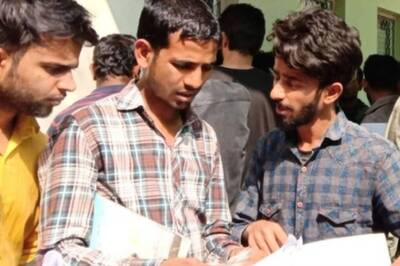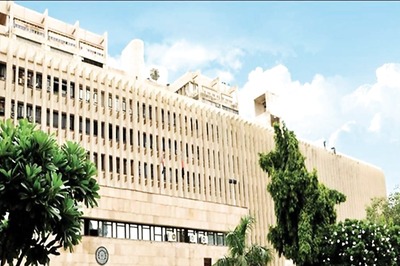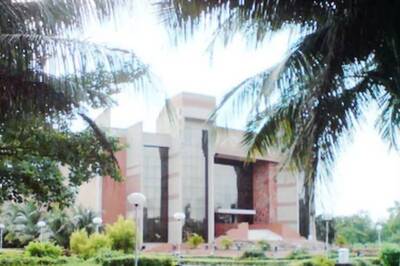
views
New Delhi: The East Delhi constituency was the most bitterly fought campaign the capital has seen in recent elections. Few days before voting, the pamphlet controversy reduced this three-cornered fight into a bipolar contest between AAP’s Atishi and cricketer-turned-BJP candidate Gautam Gambhir.
The controversy added to an already tricky campaign in East Delhi where voters are as varied as their income, status of living and demography. It’s an almost urbanised parliamentary constituency with a mix of upscale, middle class and low income neighbourhoods.
On the one hand, East Delhi has upmarket residential colonies such as Nizamuddin East, New Friends Colony, Vivek Vihar and Preet Vihar. On the other hand, the unauthorised resettlement areas and slum clusters such as Trilokpuri, Kalyanpuri, Ghondli, Khichripur, Shaheen Bagh and Okhla are inhabited by migrants. The constituency also has a sizable Muslim population, most of whom are migrants from Uttar Pradesh.
Gandhi Nagar, Delhi’s biggest wholesale garment market, is an integral part of this constituency. What greets you first here is the stench from open drains and the sight of congested lanes. Voters here are mainly from the trading class, and despite personal political leanings, issues like GST implementation and demonetisation resonate among shop owners.
Referred to as Jamnapaar (trans-Yamuna), East Delhi was also wooed by Congress leader Arvinder Singh Lovely apart from Atishi and Gambhir.
After the delimitation in 2008, the Congress and the BJP won this seat once each. In 2014, the triangular contest was won by BJP’s Maheish Girri who defeated AAP’s Rajmohan Gandhi by more than 1.9 lakh votes.
Though the 2010 Commonwealth Games brought massive development to East Delhi, the residents still feel that the benefits never fully reached their constituency.
Jitender Singh, 43, runs a shop in the Gandhi Nagar locality. Singh’s forefathers migrated from Lahore, Pakistan after Partition. Contrary to the popular narrative, Singh believes in looking at the candidate rather than the party.
“We are not permanent voters of any particular party. Last time we voted for the BJP, but never saw Mahesh Giri here after elections. He did not do any work here. Arvinder Singh Lovely is better. He has done better as an MLA in Gandhi Nagar,” Singh said.
Vipin Jain, 52, who is in the same line of business, has a different take. For him, transport, health and education are the key areas that should be the government’s priority. He says “both AAP and Congress have zero vision and are working only on ‘Modi hatao’ (remove Modi) vision,” he said, implying that he wants to vote for the BJP.
In Vishwas Nagar, sealing appears to be a cause for concern.
“There were small factories in various houses serving as their sole source of income, but they were sealed. People even borrowed money to pay penalties, but till date, sealing is in force,” said Mahendra Singh, a resident.
Rameshwar Dayal Sharma, another resident of the locality, while agreeing with Singh adds, “This government is so senseless and cruel… People will not vote Modi this time as they did in 2014.”
East Delhi is also the constituency where the AAP government seems to have found takers among majority of the people with its work in the education sector being the most talked about.
Suhail Shah, 20, is a first-time voter from Trilokpuri who runs a juice shop and is pursuing graduation from the Delhi University. Pointing towards a government school in front of his shop, Shah said, “The AAP has done very well in education sector. Government schools in Trilokpuri and Kalyanpuri are now better than private schools.”
In the middle-class neighbourhood of Patparganj, too, people have the same opinion about AAP. Moreover, people are aware that Atishi, the AAP candidate from East Delhi, was one of the driving forces behind the ‘education revolution’ in Delhi.
Forty-year-old Vaishali hails from Lucknow and works in a bakery. She alleged that the BJP “has not fulfilled its promises and is now asking for votes on national security”.
She added that the national security narrative has found takers in Patparganj and several other localities in East Delhi.
In Jangpura, however, issues are different. Gurdeep Singh, 45, runs an ice-cream shop. His grandfather had migrated to Delhi from Pakistan during Partition. A small businessman, he was hit hard by demonetisation and GST implementation. According to him, both decisions were taken in a hurry and without proper planning.
“Earlier, 20 people used to work in my shop. I scaled it down to 10 because of demonetisation and GST,” Singh said.
Things, however, are completely different in Okhla, a Muslim-dominated area and one of the most underdeveloped parts of the constituency. Here, the choice is between AAP and Congress. Such is the consensus over the two parties that many remarked that an alliance between the two would’ve been good.
Moreover, in various localities of the larger Okhla area — Sarai Julena, Okhla Village, Okhla Vihar — people appeared to be unhappy with the ruling BJP.
Aamir Jafri, 28, teaches Civil Engineering at Galgotia Institute, Noida. He resides in Okhla Vihar. Being an academic, Jafri cites examples of unemployment and PSUs to prove his point.
“BJP rule is the worst. Unemployment is high, public sector companies like BSNL and post offices are facing crises. Looking at all major parties, AAP seems better,” Jafri said.
For Mohammed Ashraf, 33, a resident of the same locality, issues that are at the top of his mind are pollution and population. Ashraf had migrated to Delhi from Bulandshahar in 1992 and runs a shop.
In Zakir Nagar, 30-year-old Saba Rehman, an independent filmmaker from western Uttar Pradesh, wishes that the candidate she votes for will focus on important issues such as education and health. “I will vote for better education and health. Also, I will categorically vote against the BJP.”
In Muslim-dominated Jamia Nagar — a part of the Okhla assembly constituency with around 3.6 lakh voters of whom around 2 lakh are Muslims — the AAP is counting on the support of the community, which plays a decisive role in the East Delhi constituency.
Mohammad Shamim, 60, sells Roohafza at a busy lane in Batla House. His father had migrated from Haryana to Delhi. Shamim, while talking about politics, suddenly stopped and showed a couple of stitches on his chest from a bypass heart surgery he recently went through at Escorts hospital.
“I like Chief Minister Arvind Kejriwal. He is very honest. It is due to him that my bypass surgery worth Rs 8 lakh was possible. If it were not for him, I would have had to sell my house for the treatment,” Shamim added.
But many people in the constituency who support AAP are worried that there is likely to be a split in the non-BJP votes as the Congress and AAP are likely to get the support of Muslims. This, many believe, will help the BJP.

















Comments
0 comment